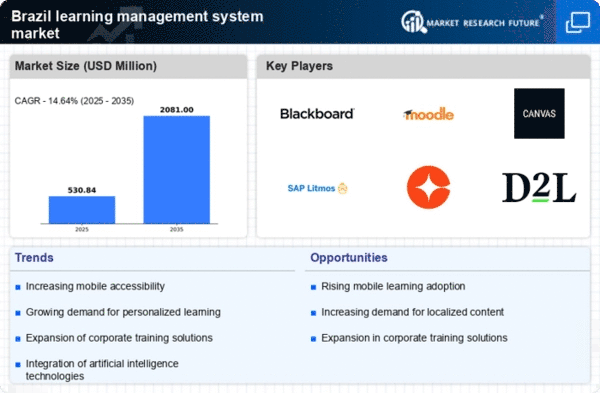The Brazil Learning Management System Market has been experiencing significant growth and evolution, driven by factors such as increasing digitalization, a rising emphasis on online education, and the need for businesses to provide employee training and development. Competitive insights into this market reveal that organizations are continuously seeking ways to enhance their learning platforms, improve user experiences, and implement advanced technologies to retain a competitive edge. Key players in the Brazilian LMS landscape are focusing on localizing their offerings to cater to the specific needs and regulations of the region, thereby increasing their market share and operational efficiency.
The dynamic environment driven by educational institutions, corporate entities, and government initiatives presents a vivid picture of the competitive landscape where innovation, functionality, and customer support play crucial roles in determining market success.Kaltura stands out in the Brazil Learning Management System Market due to its robust video platform, which enhances the overall learning experience for users. The company’s strengths lie in its ability to provide a comprehensive range of educational video solutions, including tools for live streaming, hosting, and video management tailored specifically for educational institutions and businesses in Brazil.
Kaltura has made a strong market presence by adapting its offerings to local requirements, aligning with educational frameworks, and providing flexible integration options with existing systems.
This enables institutions to engage learners through interactive content while ensuring that instructors have the necessary tools to track performance and engagement effectively. The company’s focus on partnerships with various educational entities in Brazil has further solidified its reputation as a preferred provider in the LMS ecosystem.SAP holds a significant position in the Brazil Learning Management System Market, leveraging its extensive portfolio of software solutions to cater to corporate training needs and institutional education. The company's key products in the LMS domain encompass comprehensive talent management solutions that facilitate seamless onboarding, training, and continuous employee development.
SAP's strengths include its integrated approach to learning management combined with advanced analytics, which allows organizations to measure training effectiveness and return on investment. In Brazil, SAP has also expanded its market presence through strategic mergers and acquisitions, enhancing its capabilities and offering localized solutions that cater to the regional requirements for corporate learning. This responsiveness to the evolving market landscape, coupled with its strong reputation for delivering robust enterprise software, makes SAP a formidable player in Brazil's competitive LMS market.













